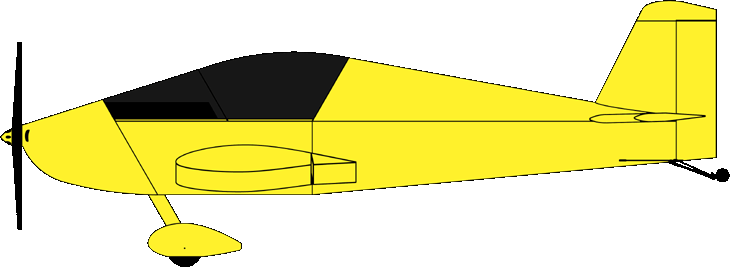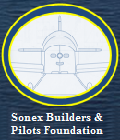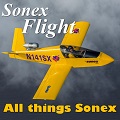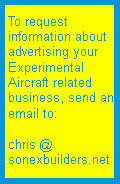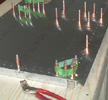

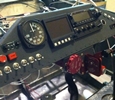
random user submitted photo
Engine Reliability?
46 posts
• Page 3 of 5 • 1, 2, 3, 4, 5
Re: Engine Reliability?
In my opinion, one thing that definitely helps support/improve the value of every Sonex is this forum, and it does that by allowing full expression of any issues and even gripes so they can be addressed in an open forum by people with direct experience and free from interference from the manufacturer (in fact and in contrast, Sonex LLC plays a very important and constructive role here by chiming in when there's a discussion that benefits from "pertinent context behind the issue" and "here's the corporate line on what we've discovered/decided" ).
Compare this with manufacturers who do everything possible to hide problems (even to the point of removing/censoring valid, truthful posts by owners of their products). I would never consider buying products from these companies, and the online behavior of the companies and any self-censorship by owners trying to preserve the value of their investment (while aiding the company in hoodwinking other future buyers) actually serves to drive down values in the long term.
Yes, criticisms need to be valid and hopefully will be expressed in a constructive manner. But telling people to shut up to protect the investment of others isn't the answer.
Compare this with manufacturers who do everything possible to hide problems (even to the point of removing/censoring valid, truthful posts by owners of their products). I would never consider buying products from these companies, and the online behavior of the companies and any self-censorship by owners trying to preserve the value of their investment (while aiding the company in hoodwinking other future buyers) actually serves to drive down values in the long term.
Yes, criticisms need to be valid and hopefully will be expressed in a constructive manner. But telling people to shut up to protect the investment of others isn't the answer.
Mark Waldron
Sonex 1230 (Builder: Jay Gibbs)
Aerovee, Trigear
Sonex 1230 (Builder: Jay Gibbs)
Aerovee, Trigear
- vigilant104
- Posts: 265
- Joined: Wed Nov 09, 2011 3:34 pm
- Location: Near Dayton, OH
Re: Engine Reliability? (Eliminate the burps)
The burps are not a new thing, nor are the reasons why a mystery. The cause and solution is simple. Burps are caused by fuel vapor bubbles traveling through the AeroCarb and into the engine. When a vapor bubble hits the intake, the mixture goes lean and the engine stumbles. This is the "burp". It's a fuel delivery issue, not so much a carb issue.
The effect is proportional to the number of bubbles. Only a few small bubbles, and you get an occasional miss or hiccup. Get lots of big bubbles, and you have a real problem keeping the engine running.
The bubbles are caused by heating the fuel within the fuel lines to the vaporization point. Exactly what this point is hard to determine. Ambient air pressure plays a part, and so does temperature, not just the outside temps but under the cowl as well.. A worst-case situation to cause burps is that the engine compartment is hot, such as after a long taxi or sitting out in the sun for hours, and the outside temps are hot with plenty of sunshine. This pumps plenty of heat into the engine compartment and the fuel lines. Throw in a high altitude airport, or MOGAS that vaporizes easier anyway, and you're stacking the deck for the burps.
How do you guard against the burps? There are several ways. Don't fly when the temps outside are hot. Don't fly if the under-cowl temps are hot and the fuel lines have been heat-soaked. Don't use MOGAS. Since those suggestions are not all that desirable, there is another way: slow the transfer of heat from the under-cowl environment to the fuel lines. This can be accomplished by insulating the lines and everything else connected to the lines. Metal lines pass heat the best, so they are the "worst offenders". Plastic & rubber lines are better. Stainless steel braided lines (over rubber inner line) is in between. Fire sleeve over the line provides some insulation, but that's not its main function. Additional insulation can be added by using fiberglass insulation, extruded foam insulation like pipe foam from the hardware store, or other methods, and the effect is cumulative, meaning that layering insulation on top of more insulation is even better. The last thing that can be done is to top off the whole thing with reflective aluminum tape to add that extra little bit and keep the whole thing neat and tidy.
Where do people go wrong? Do nothing to insulate the lines and you're rolling the dice. Fly in cool temps with 100LL and you may never have a problem, until you do and it scares you. Insulate some pieces of your lines, but totally neglect things like the gascolator, Red Cube, or fuel filter. This insulation reduces the likelihood of vaporization, but there are gaps in your armor. These gaps could let a burp develop under just the right conditions.
How do you give yourself the best possible protection? Insulate everything you can. Use stainless steel braided hose, with fire sleeve, and then wrap in pipe foam and coat it all with reflective aluminum tape. And don't forget to protect all the other "stuff". Route your fuel lines with a constant downward slope and don't create high spots to trap bubbles (those traps will let go of their bubbles at the worst time, like right after rotating for takeoff). If you use a gascolator, insulate it - use fiberglass wrap, pipe foam, build an enclosure and feed cool air to it, something. Use a filter? - wrap some insulation around it. Thinking of departing in the afternoon, after parked on the ramp for hours on end, and it's 100 degrees out, you might want to de-cowl and cool things off.
Folks, the bottom line is this. The burps are something that we understand, and the solutions are well known. Implement your fuel system properly using the accumulated knowledge from the community, and you'll be just fine.
Jeff
The effect is proportional to the number of bubbles. Only a few small bubbles, and you get an occasional miss or hiccup. Get lots of big bubbles, and you have a real problem keeping the engine running.
The bubbles are caused by heating the fuel within the fuel lines to the vaporization point. Exactly what this point is hard to determine. Ambient air pressure plays a part, and so does temperature, not just the outside temps but under the cowl as well.. A worst-case situation to cause burps is that the engine compartment is hot, such as after a long taxi or sitting out in the sun for hours, and the outside temps are hot with plenty of sunshine. This pumps plenty of heat into the engine compartment and the fuel lines. Throw in a high altitude airport, or MOGAS that vaporizes easier anyway, and you're stacking the deck for the burps.
How do you guard against the burps? There are several ways. Don't fly when the temps outside are hot. Don't fly if the under-cowl temps are hot and the fuel lines have been heat-soaked. Don't use MOGAS. Since those suggestions are not all that desirable, there is another way: slow the transfer of heat from the under-cowl environment to the fuel lines. This can be accomplished by insulating the lines and everything else connected to the lines. Metal lines pass heat the best, so they are the "worst offenders". Plastic & rubber lines are better. Stainless steel braided lines (over rubber inner line) is in between. Fire sleeve over the line provides some insulation, but that's not its main function. Additional insulation can be added by using fiberglass insulation, extruded foam insulation like pipe foam from the hardware store, or other methods, and the effect is cumulative, meaning that layering insulation on top of more insulation is even better. The last thing that can be done is to top off the whole thing with reflective aluminum tape to add that extra little bit and keep the whole thing neat and tidy.
Where do people go wrong? Do nothing to insulate the lines and you're rolling the dice. Fly in cool temps with 100LL and you may never have a problem, until you do and it scares you. Insulate some pieces of your lines, but totally neglect things like the gascolator, Red Cube, or fuel filter. This insulation reduces the likelihood of vaporization, but there are gaps in your armor. These gaps could let a burp develop under just the right conditions.
How do you give yourself the best possible protection? Insulate everything you can. Use stainless steel braided hose, with fire sleeve, and then wrap in pipe foam and coat it all with reflective aluminum tape. And don't forget to protect all the other "stuff". Route your fuel lines with a constant downward slope and don't create high spots to trap bubbles (those traps will let go of their bubbles at the worst time, like right after rotating for takeoff). If you use a gascolator, insulate it - use fiberglass wrap, pipe foam, build an enclosure and feed cool air to it, something. Use a filter? - wrap some insulation around it. Thinking of departing in the afternoon, after parked on the ramp for hours on end, and it's 100 degrees out, you might want to de-cowl and cool things off.
Folks, the bottom line is this. The burps are something that we understand, and the solutions are well known. Implement your fuel system properly using the accumulated knowledge from the community, and you'll be just fine.
Jeff
Last edited by sonex1374 on Fri Mar 02, 2018 11:54 am, edited 1 time in total.
- sonex1374
- Posts: 605
- Joined: Thu Mar 27, 2014 1:02 am
Re: Engine Reliability?
I would like to second Jeff’s recommendations on eliminating the burps. I have done as Jeff recommends and have not had any burps even in the afternoon summer in Florida.
I would also like to defend my friend Scott. We all know there are a small group of people on this forum who love to beat up the Aerovee and Sonex. I do not believe that Scott was addressing legitimate issues people have from time to time but was rather addressing those few who are very vocal and never have anything good to say. These few people often dominate this forum and make it sound like the sky is falling.
As for me, I am going to go finish my annual condition inspection and go flying...
Jake
I would also like to defend my friend Scott. We all know there are a small group of people on this forum who love to beat up the Aerovee and Sonex. I do not believe that Scott was addressing legitimate issues people have from time to time but was rather addressing those few who are very vocal and never have anything good to say. These few people often dominate this forum and make it sound like the sky is falling.
As for me, I am going to go finish my annual condition inspection and go flying...
Jake
Sonex Tri Gear, Rotax 912 ULS, Sensenich 3 Blade Ground Adjustable Propeller
MGL Velocity EMS, Garmin GTR 200 Comm, GTX 335 ADS B Out Transponder
ILevil AW AHRS & ADS-B In, UAvionix AV20S
200+ hours previously with Aerovee engine
Sarasota, Florida
MGL Velocity EMS, Garmin GTR 200 Comm, GTX 335 ADS B Out Transponder
ILevil AW AHRS & ADS-B In, UAvionix AV20S
200+ hours previously with Aerovee engine
Sarasota, Florida
-

SonexN76ET - Posts: 494
- Joined: Tue Aug 27, 2013 2:39 pm
- Location: Atlanta
Re: Engine Reliability? (Eliminate the burps)
sonex1374 wrote:Folks, the bottom line is this. The burps are something that we understand, and the solutions are well known. Do your fuel system properly using the accumulated knowledge, and you'll be just fine.
Jeff
Jeff - I agree that there are ways to minimize or maybe even eliminate the burps but do you think that 500+ builders all know all the information you posted above or know enough to research burps before they go fly? Do you think that all second hand owners have researched the issue and made sure that the original builder incorporated the correct preventative measures before they go fly in hot weather or with mo-gas? If it is so well known then why has Sonex not issued a service bulletin detailing the information above?
I'm still not convinced that the burps can't cause an engine to quit on takeoff or that none of the accidents couldn't have had some sort of burp component to them. Unfortunately the NTSB investigations don't go into enough detail to tell and I highly doubt that the people that do the investigations even know the burp problems exist or know enough to look for insulation on the fuel line. The only evidence that there is an issue can only be found on an internet forum.
Keith
#554
- kmacht
- Posts: 772
- Joined: Tue Jun 21, 2011 11:30 am
Re: Engine Reliability?
daleandee wrote:mcjon77 wrote:That is what I remember too. IIRC, the "burping" issue wasn't limited to Aerovees. Jabirus that were using the Aerocarb instead of the standard bing carb also had that issue ...
You are quite correct. The problem with burps isn't the engine it's the Aerocarb. I was excoriated on this list for giving my personal opinion on the Aerocarb so I dare not repeat it. But I believe this "burping" issue is serious enough that every new builder that intends to use an Aerocarb should be made aware of it.
Here is a video example of the burps: https://www.youtube.com/watch?v=S6GD5s7osHE
If my airplane did that on the take-off roll it would be back in the hangar. My airplane should run at least as good as the truck I drove to the airport.
Dale Williams
N319WF @ 6J2
Myunn - "daughter of Cleanex"
120 HP - 3.0 Corvair
Tail Wheel - Center Stick
Signature Finish 2200 Paint Job
171.9 hours / Status - Flying
Member # 109 - Florida Sonex Association
Latest video: https://www.youtube.com/watch?v=1VP7UYEqQ-g
The burping is vapor/air in the fuel passing through the AeroCarb/AeroInjector, which introduces a momentary lean condition in a cylinder. Saying the burp is caused by an AeroCarb/AeroInjctor is like saying a float-bowl carburetor causes water to accumulate in the float bowl, in turn causing an engine stoppage. Water in the fuel is what causes water in the float bowl and an engine stoppage.
There is no magic to an AeroInjector/AeroCarb. All it does it accept whatever the fuel system delivers in the way of fuel (or air, or water, or debris) and mix it with the air the engine sucks in with each intake stroke (and that depends on valve settings, valve timing, ring condition, air filter, etc.).
So how do you eliminate burps? First, not everyone with an AeroInjector/AeroCarb has them. But if you do have them you examine the fuel system to make sure air/vapor cannot pass through your fuel lines or get trapped in your fuel and you take steps to keep your fuel cool to prevent it from turning to vapor before it reaches the AeroInjector. Low octane fuel (mogas) goes to vapor at a lower temperature than 100LL.
I agree with Dale on this comment:
"If my airplane did that on the take-off roll it would be back in the hangar. My airplane should run at least as good as the truck I drove to the airport."
Unfortunately, not every pilot feels the same and not every builder takes care in their workmanship or maintenance. "Maybe if I just fly it enough it will fix itself." "I was told they just do that." An amazing number of first flights are conducted with the builder not having taken any steps to tune their engine. A growing number of airplanes are changing hands and their new owners are fully unfamiliar with what they purchased and where to begin to sort out the issues the airframe or engine present them. The problem is further compounded by airplanes that have systems modified by the original builder (or the second, or third, or fourth owner), leaving the new owner with a system they assume is correct but is, in fact, a prototype.
Kerry Fores
Sonex Tech Support Manager
Builder s/n 009, N912SX, "Metal Illness"
2006 AirVenture Plans Built Champion
500 hours flying on an AeroCarb
22,000+ hours providing Sonex/AeroVee/AeroCarb/AeroInjector Support
Last edited by SonexFactoryTech on Thu Mar 01, 2018 3:04 pm, edited 1 time in total.
- SonexFactoryTech
- Posts: 29
- Joined: Mon Mar 09, 2015 3:28 pm
Re: Engine Reliability?
RE: Insulating Fuel Lines
I have just one short comment in regard to insulating anything with "plumbers pipe insulation". The stuff I tested was quite flammable and also gave off toxic vapors when ignited. A good reason you don't see it on a certified airplane.
Use the proper "fire sleeve" material..........there is a reason it costs more.
Gordon..........Onex.....Hummel 2400
I have just one short comment in regard to insulating anything with "plumbers pipe insulation". The stuff I tested was quite flammable and also gave off toxic vapors when ignited. A good reason you don't see it on a certified airplane.
Use the proper "fire sleeve" material..........there is a reason it costs more.
Gordon..........Onex.....Hummel 2400
- Gordon
- Posts: 178
- Joined: Thu Sep 07, 2017 9:20 pm
Re: Engine Reliability?
SonexFactoryTech wrote:daleandee wrote:mcjon77 wrote:That is what I remember too. IIRC, the "burping" issue wasn't limited to Aerovees. Jabirus that were using the Aerocarb instead of the standard bing carb also had that issue ...
You are quite correct. The problem with burps isn't the engine it's the Aerocarb. I was excoriated on this list for giving my personal opinion on the Aerocarb so I dare not repeat it. But I believe this "burping" issue is serious enough that every new builder that intends to use an Aerocarb should be made aware of it.
Here is a video example of the burps: https://www.youtube.com/watch?v=S6GD5s7osHE
If my airplane did that on the take-off roll it would be back in the hangar. My airplane should run at least as good as the truck I drove to the airport.
Dale Williams
N319WF @ 6J2
Myunn - "daughter of Cleanex"
120 HP - 3.0 Corvair
Tail Wheel - Center Stick
Signature Finish 2200 Paint Job
171.9 hours / Status - Flying
Member # 109 - Florida Sonex Association
Latest video: https://www.youtube.com/watch?v=1VP7UYEqQ-g
The burping is vapor/air in the fuel passing through the AeroCarb/AeroInjector, which introduces a momentary lean condition in a cylinder. Saying the burp is caused by an AeroCarb/AeroInjctor is like saying a float-bowl carburetor causes water to accumulate in the float bowl, in turn causing an engine stoppage. Water in the fuel is what causes water in the float bowl and an engine stoppage.
There is no magic to an AeroInjector/AeroCarb. All it does it accept whatever the fuel system delivers in the way of fuel (or air, or water, or debris) and mix it with the air the engine sucks in with each intake stroke (and that depends on valve settings, valve timing, ring condition, air filter, etc.).
So how do you eliminate burps? First, not everyone with an AeroInjector/AeroCarb has them. But if you do have them you examine the fuel system to make sure air/vapor cannot pass through your fuel lines or get trapped in your fuel and you take steps to keep your fuel cool to prevent it from turning to vapor before it reaches the AeroInjector. Low octane fuel (mogas) goes to vapor at a lower temperature than 100LL.
I agree with Dale on this comment:
"If my airplane did that on the take-off roll it would be back in the hangar. My airplane should run at least as good as the truck I drove to the airport."
Unfortunately, not every pilot feels the same and not every builder takes care in their workmanship or maintenance. "Maybe if I just fly it enough it will fix itself." "I was told they just do that." An amazing number of first flights are conducted with the builder not having taken any steps to tune their engine. A growing number of airplanes are changing hands and their new owners are fully unfamiliar with what they purchased and where to begin to sort out the issues the airframe or engine present them. The problem is further compounded by airplanes that have systems modified by the original builder (or the second, or third, or fourth owner), leaving the new owner with a system they assume is correct but is, in fact, a prototype.
Kerry Fores
Sonex Tech Support Manager
Builder s/n 009, N912SX, "Metal Illness"
2006 AirVenture Plans Built Champion
500 hours flying on an AeroCarb
22,000+ hours providing Sonex/AeroVee/AeroCarb/AeroInjector Support
Word!
Andrew
#618
PS: Always nice to see anything written by Kerry. Brings warmth to my cold heart.
- andrewp
- Posts: 213
- Joined: Mon Oct 14, 2013 11:10 pm
Re: Engine Reliability?
Gordon wrote:RE: Insulating Fuel Lines
I have just one short comment in regard to insulating anything with "plumbers pipe insulation". The stuff I tested was quite flammable and also gave off toxic vapors when ignited. A good reason you don't see it on a certified airplane.
Use the proper "fire sleeve" material..........there is a reason it costs more.
Gordon..........Onex.....Hummel 2400
Except that firesleeve isn't a great insulator. I accepted that the pipe insulation was flammable and mitigated that by wrapping the foam with aluminum tape so that only a "for real" fire would ignite the foam. I felt the danger of the "burps" outweighed the danger of the pipe insulation. Probably there are better solutions than Home Depot pipe insulation?
- radfordc
- Posts: 573
- Joined: Fri Jun 03, 2011 9:39 am
Re: Engine Reliability?
kmacht wrote:A real solution would be to redesign the aerocarb so it isn't susceptible to air bubbles in the first place.
The Aerocarb has a lot going for it....probably as simple as you can make an effective fuel metering device, resists icing, and relatively inexpensive (as aviation things go). It's possible to prevent the bubbles in the fuel from forming....or at least I and many others have done so.
- radfordc
- Posts: 573
- Joined: Fri Jun 03, 2011 9:39 am
Re: Engine Reliability?
SonexN76ET wrote:I would like to second Jeff’s recommendations on eliminating the burps. I have done as Jeff recommends and have not had any burps even in the afternoon summer in Florida.
I would also like to defend my friend Scott. We all know there are a small group of people on this forum who love to beat up the Aerovee and Sonex. I do not believe that Scott was addressing legitimate issues people have from time to time but was rather addressing those few who are very vocal and never have anything good to say. These few people often dominate this forum and make it sound like the sky is falling.
As for me, I am going to go finish my annual condition inspection and go flying...
Jake
Thank you Jake for understanding the intention of my post. I’m not trying to say shut up and hide known problems...
I enjoy this forum, my Sonex and the friends I’ve met because of this hobby. It gets tiring to log on here and just see constant negativity towards a few items...the AeroVee being one of them.
Scott Meyer
Sonex 1629 - Sold...9/2019
Sonex 1629 - Sold...9/2019
- ScottM-Sonex1629
- Posts: 441
- Joined: Sun Aug 11, 2013 10:00 pm
- Location: Dublin, Ohio (MRT)
46 posts
• Page 3 of 5 • 1, 2, 3, 4, 5
Who is online
Users browsing this forum: No registered users and 20 guests
